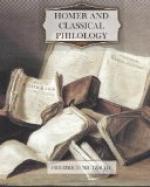All these schools of thought start from the assumption that the problem of the present form of these epics can be solved from the standpoint of an aesthetic judgment—but we must await the decision as to the authorised line of demarcation between the man of genius and the poetical soul of the people. Are there characteristic differences between the utterances of the man of genius and the poetical soul of the people?
This whole contrast, however, is unjust and misleading. There is no more dangerous assumption in modern aesthetics than that of popular poetry and individual poetry, or, as it is usually called, artistic poetry. This is the reaction, or, if you will, the superstition, which followed upon the most momentous discovery of historico-philological science, the discovery and appreciation of the soul of the people. For this discovery prepared the way for a coming scientific view of history, which was until then, and in many respects is even now, a mere collection of materials, with the prospect that new materials would continue to be added, and that the huge, overflowing pile would never be systematically arranged. The people now understood for the first time that the long-felt power of greater individualities and wills was larger than the pitifully small will of an individual man;[1] they now saw that everything truly great in the kingdom of the will could not have its deepest root in the inefficacious and ephemeral individual will; and, finally, they now discovered the powerful instincts of the masses, and diagnosed those unconscious impulses to be the foundations and supports of the so-called universal history. But the newly-lighted flame also cast its shadow: and this shadow was none other than that superstition already referred to, which popular poetry set up in opposition to individual poetry, and thus enlarged the comprehension of the people’s soul to that of the people’s mind. By the misapplication of a tempting analogical inference, people had reached the point of applying




